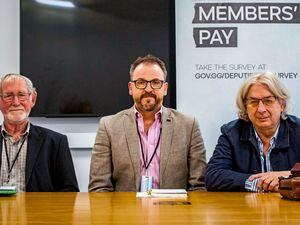OPINION: Your blueprint for the future…
If you want your grandkid’s grandchildren to have a future in Guernsey, things have to change. And that, says Richard Digard, is why we need Government 2.0

A COUPLE of weeks ago I suggested here that whether the States was too small-c conservative or little-s socialist was irrelevant, because unless islanders were clear on what sort of future they wanted nothing much was going to change.
‘Excellent column,’ said one of my more diligent readers.
‘Sadly, more questions than answers.’ Well, yes, because I don’t know what people want any more than you do. And also because the piece was more a call to arms – ‘speak up islanders for heaven’s sake or the system will do it for you’ – than a problem-solver.
Nevertheless, it was a fair point to make. So let’s set out what we should be doing to secure the sort of future we want for ourselves and the grandkids’ grandchildren.
Firstly, put aside any grand notions of creating some sort of utopian Guernsey based on the 1950s idyll. The future is firmly rooted in capitalism, commerce – and creativity.
The reason for that is brutally simple. No one, apart from you and I, gives a damn about Guernsey.
It’s a tiny, insignificant speck that exists by a fluke of history (conflict with France, not the upwellings of granitic magma that created the land mass 600m. years ago and then became an island around 6000BC when rising sea levels formed the English Channel).
Continuing to stand on our own requires resourcefulness, vigilance, an ability to pay our way and not antagonise larger neighbours. In turn, that means establishing a very clear reason for people and businesses to be here so that tax revenues can meet the high costs of maintaining what is effectively a sub-scale micro-state.
You can see, that’s quite a big ask, and the burden of maintaining an independent social security, welfare and health system is already borderline unsustainable.
So if you want a blueprint for the future, it’s this: embrace change and, as Apple used to tell us, Think Different. Accept things will indeed be different and you might not like them. But then, they’re not for you, are they? They’re for those who are younger and want a standard of living no worse than yours.
This means decentralising government. Since the Occupation, the States has infiltrated all aspects of island life – even where, as consultants Tribal Helm/Capita said, there was no clear rationale at all for government intervention. Outsourcing to the voluntary and private sectors is now urgently overdue.
Government response times need to be improved dramatically and innovation baked into problem-solving. And that means listening more to those here with skin in the game.
Yes, forming genuine partnerships with industry and charities and accepting that they probably know better than bureaucrats and politicians.
After all, sheer numbers alone mean there are better brains and more relevant experience outside government than inside (notwithstanding some excellent individuals in the States). This is a resource that must be exploited and not – as now – controlled and paid lip-service to through ‘consultations’.
Attitudes to risk need to be revised and established so the parameters of what the island expects and can tolerate are clear. No more last minute, ‘bureaucrat says no’ surprises. Making things happen, understanding commerce and competition becomes the default position of government.
Politically, this is difficult. The standard setting of the Assembly is also to control. Yet an innovation mindset is essential if timely and creative decisions are to be taken to drive Guernsey’s best interests forward. Those interests, remember, are served only if sufficient taxpayers remain here to cover the costs of our independence, security, schooling and health and welfare.
Accept this, and the future also means more and different development to facilitate an economically secure future.
Look at Madeira, as close to paradise on earth as you can get, but which had to innovate to facilitate tourism (hello, Guernsey) and set up a free trade zone in order to pay its bills.
Immediately, what’s wrong with three-plus storey housing?
Or modular builds to keep down costs? Equality does not mean living like Guy Hands (other local billionaires are available), but it does mean providing adequate and affordable housing.
When, for instance, did the States challenge the construction industry to build X homes for Y price and ask what government might need to do to help?
The time for Guernsey doing the same things and expecting a better outcome is fast running out.
PwC has estimated, for instance, that a third of Guernsey’s workforce – mainly in better paid, higher taxpaying financial services – are at risk from AI automation in fewer than 15 years.
Think about that a bit and Covid and the consequent staff shortages here can only accelerate the dash towards de-staffing and reducing human costs, but we have no plan in place for that or even an acknowledgement of the risks/opportunities AI poses.
Look at it in the round and Guernsey faces geo-political, pandemic, immigration, artificial intelligence, Brexit, and climate change issues as well as its own cash crisis. And all, as things stand, plans to resolve them by adopting the same old business as usual approach.
In short, for the future to be survivable, we need Government 2.0, a true collaboration between islanders, wealth-creators and the voluntary sector focused on maintaining the Bailiwick’s micro-state independence while remaining true to what we might term brand Guernsey.
It’s do-able and, done successfully, would be saleable to other small jurisdictions – better, more efficient government’s a holy grail after all, and any difficulties are worth the pain.
And if you feel not, consider this: the situation we find ourselves in today was overseen by a system that continues to think it knows best.





